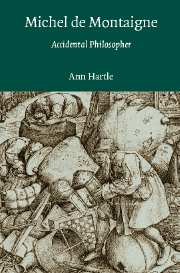Book contents
- Frontmatter
- Contents
- Acknowledgments
- Note on the Texts
- Introduction
- PART I A NEW FIGURE
- PART II ACCIDENTAL PHILOSOPHY
- PART III THE CHARACTER OF THE ACCIDENTAL PHILOSOPHER
- 7 Montaigne's Character: The Great-Souled Man without Pride
- 8 What He Learned in the Nursery: Accidental Moral Philosophy and Montaigne's Reformation
- 9 Christianity and the Limits of Politics
- Notes
- Works Cited
- Index
9 - Christianity and the Limits of Politics
Published online by Cambridge University Press: 23 July 2009
- Frontmatter
- Contents
- Acknowledgments
- Note on the Texts
- Introduction
- PART I A NEW FIGURE
- PART II ACCIDENTAL PHILOSOPHY
- PART III THE CHARACTER OF THE ACCIDENTAL PHILOSOPHER
- 7 Montaigne's Character: The Great-Souled Man without Pride
- 8 What He Learned in the Nursery: Accidental Moral Philosophy and Montaigne's Reformation
- 9 Christianity and the Limits of Politics
- Notes
- Works Cited
- Index
Summary
Modern political philosophy must come to terms with the fundamental issue of the relationship of politics and Christianity, for Christianity, unlike pagan religion, is both universal and otherworldly, whereas the political realm is exclusive and is precisely this world. In Book IV of his Social Contract, Rousseau provides us with a full and clear statement of what he regards as the problem posed by Christianity, which also expresses many of the concerns found in Machiavelli and Hobbes. I begin this chapter by setting out the main lines of Rousseau's paradigmatic account and then I discuss Montaigne's views against that background. Montaigne, as I understand him, is very much at odds with the prevailing tendencies of modern political philosophy, especially with respect to religion.
Rousseau acknowledges that religion is not only essential but is even the necessary foundation for political society: “A State has never been founded without religion serving as its base.” Christianity, however, is “more harmful than useful to the strong constitution of a State.” Rousseau takes us through the history of civilization in order to show why Christianity poses such a threat to politics. Ancient political societies all began as theocracies: no distinction existed between the religion and the laws of a people. Each city had its own gods, and the gods of one people had no rights over other peoples. Political war, then, was also theological, but men did not fight for their gods: rather, as in Homer, the gods fought for men.
- Type
- Chapter
- Information
- Michel de MontaigneAccidental Philosopher, pp. 217 - 240Publisher: Cambridge University PressPrint publication year: 2003

